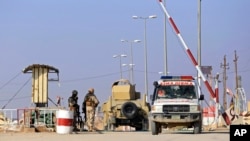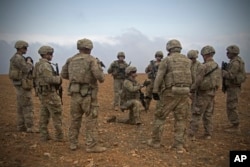The U.S.-led coalition against the Islamic State (IS) Friday denied it was blocked by Iran-backed Popular Mobilization Forces (PMF) from conducting a military inspection in Iraq's Anbar province near the Syrian border.
In an email to VOA, the U.S.-led international coalition's Combined Joint Task Force Operation Inherent Resolve (CJTF-OIR) said the operation in western Anbar earlier this week was coordinated with the Iraqi Security Forces (ISF) and the purpose of it was to survey Iraqi border security posts with Syria as a part of the ongoing effort to defeat IS.
"This survey was planned, coordinated and conducted with the ISF, and occurred without incident," CJTF-OIR told VOA.
"Coalition forces and the ISF work together to secure the borders of Iraq, protecting the people of Iraq and supporting security that ensures the lasting defeat of ISIS," it added, using an acronym for the militant group.
The response from the coalition comes as Iraq's Popular Mobilization Forces (PMF) in a statement Tuesday said it prevented the U.S. forces with the anti-IS coalition from carrying out a "suspicious reconnaissance" operation on the Iraqi border with Syria.
"The Anbar command of the Mobilization Forces prevented the American forces from completing the survey, forcing them to return to their base and not to approach the units of Popular Mobilization Forces," Qasem Musleh, the PMF field operations commander in Anbar, said in the statement.
Musleh accused the U.S. of violating Iraqi sovereignty, claiming the U.S.-led coalition collected "dangerous" information about the Iraqi border patrol, the number of combat points, the quantity of ammunition, the type of weaponry and the number of personnel present at each border point.
"American provocations have come to reveal secret information about our troops stationed at the border," he said, adding, "This information reveals the secret of the forces stationed there, making it easy to target."
Popular Mobilization Forces (PMF)
The PMF is an umbrella organization of several Shiite militias formed in 2014 after the Iraqi army fled the area following IS attacks. The group includes U.S. terror-designated militias, such as Asa'ib Ahl al-Haq and the Badr organization, and Iranian-friendly parties such as the Islamic Supreme Council of Iraq.
Empowered by Iran, the group played a key role in driving U.S.-backed Kurdish peshmerga forces out of Kirkuk and other disputed territories in northern Iraq following a Kurdish referendum for independence in late 2017.
U.S. officials in the past have stated the group works as a regional proxy to Iran and is increasingly threatening and provoking American troops in Iraq and Syria.
An assessment of the U.S. anti-IS operations by the Pentagon's Office of the Inspector General (OIG) last November warned that the PMF's increased military and political power, along with their willingness to act independently of the Iraqi security forces, could further Iran's influence in Iraq.
The Pentagon report said the Iranian proxies continued their threatening rhetoric against the U.S. presence in Iraq. It added Iran-backed militias were likely behind two attacks targeting U.S. facilities in Iraq last September, including mortar attacks that targeted Baghdad's Green Zone and landed near the U.S. embassy, and rocket attacks that targeted the Basra Airport, near the U.S. consulate.
The mortar fire on the U.S. Embassy in Baghdad then prompted the White House's National Security Council to ask the Pentagon for plans to attack Iran, according to a Wall Street Journal report.
The U.S. consulate in Basra has been closed since Sept. 28, when U.S. Secretary of State Mike Pompeo announced the U.S. would be relocating diplomatic personnel from the city following increasing threats from Iran and Iran-backed militia.
National security correspondent Jeff Seldin contributed to this report.





